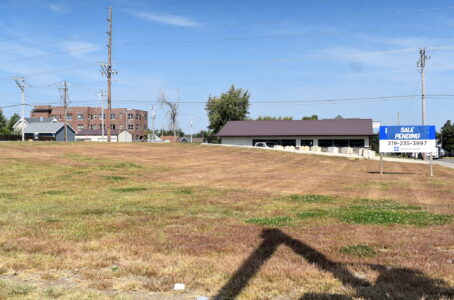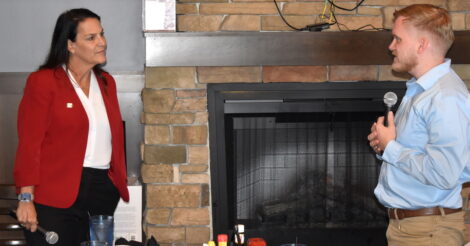Council passes second reading of JBS rezone request after public hearing

T-R PHOTO BY ROBERT MAHARRY — JBS Corporate Engineer Brad Carl addresses the Marshalltown city council about a rezoning request to pave the way for the construction of a new stormwater retention pond during Monday night’s meeting. The council passed the second reading by a 6-1 vote.
After a public hearing with several comments and a response from JBS Corporate Engineer Brad Carl, the Marshalltown city council voted 6-1 to proceed with the rezoning of several properties currently classified as medium density residential to pave the way for the company’s construction of a stormwater detention basin on North 10th Avenue during Monday night’s meeting.
A vote to pass the first reading passed by the same tally two weeks ago with Mark Mitchell casting the lone dissenting vote. Assistant Housing and Community Development Director Clayton Ender explained the proposal to rezone the approximately 1.17 acres and shared renderings illustrating the intended usage of the area, which would pave the way for the expansion of the meatpacking giant’s distribution warehouse.
“While the general industrial district is typically not consistent with this zoning district, the conditions that have been recommended by staff and further recommended by the Planning and Zoning Commission are designed to create consistency with the comprehensive plan and adjacent land uses,” Ender said. “Really, what the conditions are is uses that were previously listed as special use permit for the general industrial district have been moved to prohibited uses, and uses that would normally be permitted but were not otherwise consistent with the medium density residential district were moved to special use permit. That way, if there was ever those intended uses, there’d be a higher level of review that would have to go in front of the Planning and Zoning Commission and the Board of Adjustment.”
Ender felt the area had sufficient land to accommodate the proposed usage and other uses if plans changed in the future. He said the basin would address flood protection and water quality improvement. JBS currently has a stormwater retention pond adjacent to the warehouse on the west side of North 10th Avenue at the corner of Bromley and 10th Avenue, and it would be eliminated once the new basin is completed with a need for a new location and additional capacity to accommodate the new impervious surface.
“This would really only take the stormwater from the warehouse facility itself. Areas to the north of it would not be addressed within this facility as they do not flow into this direction,” Ender said.
As for the tax implications, he said the parcels would be reclassified as either commercial or industrial land uses and qualify for a 90 percent rollback with possible changes in land valuation and an overall increase in tax revenue. The P&Z Commission has recommended approval of the change.
During the public comment period, Dave Grieve reiterated his position that the council should not be doing anything to encourage the growth of JBS and suggested they should pay taxes on the cost they paid to buy the land. He noted the fact that Iowa is home to 25 million hogs at any given time and wondered why farmers in the state couldn’t diversify their operations beyond pigs, corn and soybeans.
Tim Bradbury, who has worked at JBS for 38 years and lives in the area, said he appreciated the opportunities the company has provided for people like him in Marshalltown, and he felt the company makes efforts to address issues with the smell. He did, however, express concern for neighboring residents and hoped they would be considered.
Linda Clark reiterated her frustrations about the smell the plant produces.
“It is a problem. We want people to move here. We want things to be better just like Mr. Bradbury said, but we have to look at the whole total picture. Oh, that looks real sweet right there, but that doesn’t necessarily mean that’s what’s gonna happen. And I say please vote no on this,” she said.
Carl then came forward to explain more details on the project, noting that the company has had zero issues or complaints with its current retention area. He said the Marshalltown plant serves and feeds over 80 million people a week and reiterated Ender’s comment about the increased tax revenue. According to Carl, JBS has over $1.1 billion of economic impact on hog procurement in the state and a $185 million annual payroll in Marshalltown alone.
“All I’m saying is JBS needs this to grow the business. I think I mentioned this the last time we talked, you know, our business is changing. We have more boxes that need to be shipped out. We’re building an addition onto our distribution center,” he said. “JBS is not asking for this retention pond. It’s the city of Marshalltown. It’s part of your ordinance. It’s part of the building requirement. The city of Marshalltown is requesting this, so just to summarize, there’s no rodents, there’s no swamp area, it’s a 24 to 48 hour (time frame in a) rain event, so it doesn’t really take that long… If you understand a retention system, water comes in, and water goes out, so it’s meant to detain the water for a certain amount of time so that you get the total suspended solids to drop and any kind of impurity that’s inside of that water. And that’s really the sole purpose for any retention pond.”
There are plenty of other retention ponds in the city at both industrial sites and apartment complexes, Carl noted, and he couldn’t understand why this particular one was such an issue with the public. After the hearing was closed and a motion and second were made to approve the request, Councilor Mark Mitchell asked to have more meetings with JBS to address certain issues and said he would vote no until he had the answers he desired.
The motion again passed 6-1 with Mitchell as the lone dissenting vote. Afterward, Mayor Joel Greer said city officials do have “regular meetings” with JBS leadership and expressed his appreciation for the company, which is Marshalltown’s largest employer by a wide margin.





